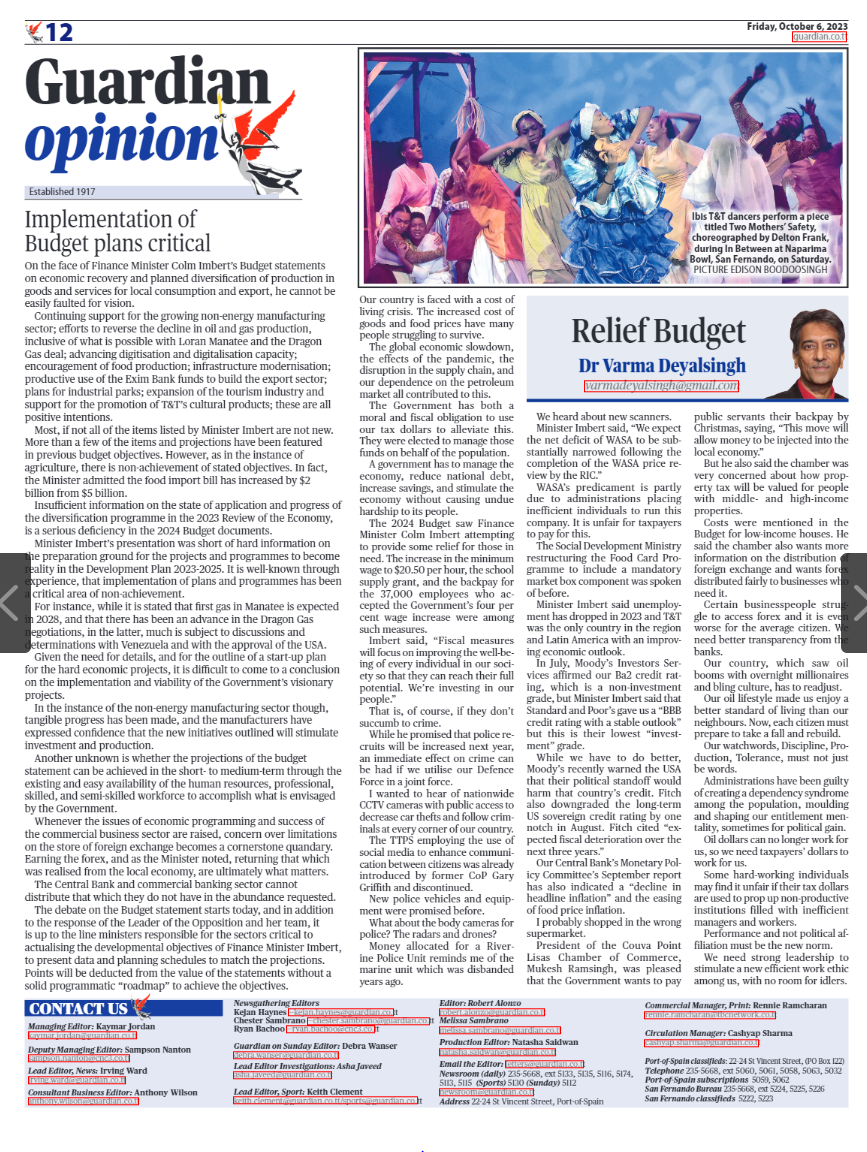Implementation of Budget plans critical
On the face of Finance Minister Colm Imbert’s
Budget statements on economic recovery and
planned diversiication of production in goods and
services for local consumption and export, he
cannot be easily faulted for vision.
Continuing support for the growing non-energy
manufacturing sector; eforts to reverse the
decline in oil and gas production, inclusive of
what is possible with Loran Manatee and the
Dragon Gas deal; advancing digitisation and
digitalisation capacity; encouragement of food
production; infrastructure modernisation;
productive use of the Exim Bank funds to build
the export sector; plans for industrial parks;
expansion of the tourism industry and support
for the promotion of T&T’s cultural products;
these are all positive intentions.
Most, if not all of the items listed by Minister
Imbert are not new.
More than a few of the items and projections
have been featured in previous budget objectives.
However, as in the instance of agriculture, there
is non-achievement of stated objectives. In fact,
the Minister admitted the food import bill has
increased by $2 billion from $5 billion.
Insuicient information on the state of application
and progress of the diversiication programme in
the 2023 Review of the Economy, is a serious
deiciency in the 2024 Budget documents.
Minister Imbert’s presentation was short of hard
information on the preparation ground for the
projects and programmes to become reality in the
Development Plan 2023-2025. It is well-known
through experience, that implementation of
plans and programmes has been a critical area of
non-achievement.
For instance, while it is stated that irst gas in
Manatee is expected in 2028, and that there has
been an advance in the Dragon Gas negotiations,
in the latter, much is subject to discussions and
determinations with Venezuela and with the
approval of the USA.
Given the need for details, and for the outline of a
start-up plan for the hard economic projects, it is
diicult to come to a conclusion on the
implementation and viability of the
Government’s visionary projects.
In the instance of the non-energy manufacturing
sector though, tangible progress has been made,
and the manufacturers have expressed conidence
that the new initiatives outlined will stimulate
investment and production.
Another unknown is whether the projections of
the budget statement can be achieved in the
short- to medium-term through the existing and
easy availability of the human resources,
professional, skilled, and semi-skilled workforce
to accomplish what is envisaged by the
Government.
Whenever the issues of economic programming
and success of the commercial business sector
are raised, concern over limitations on the store
of foreign exchange becomes a cornerstone
quandary.
Earning the forex, and as the Minister noted,
returning that which was realised from the local
economy, are ultimately what matters.
The Central Bank and commercial banking sector
cannot distribute that which they do not have in
the abundance requested.
The debate on the Budget statement starts today,
and in addition to the response of the Leader of
the Opposition and her team, it is up to the line
ministers responsible for the sectors critical to
actualising the developmental objectives of
Finance Minister Imbert, to present data and
planning schedules to match the projections.
Points will be deducted from the value of the
statements without a solid programmatic
“roadmap” to achieve the objectives.

